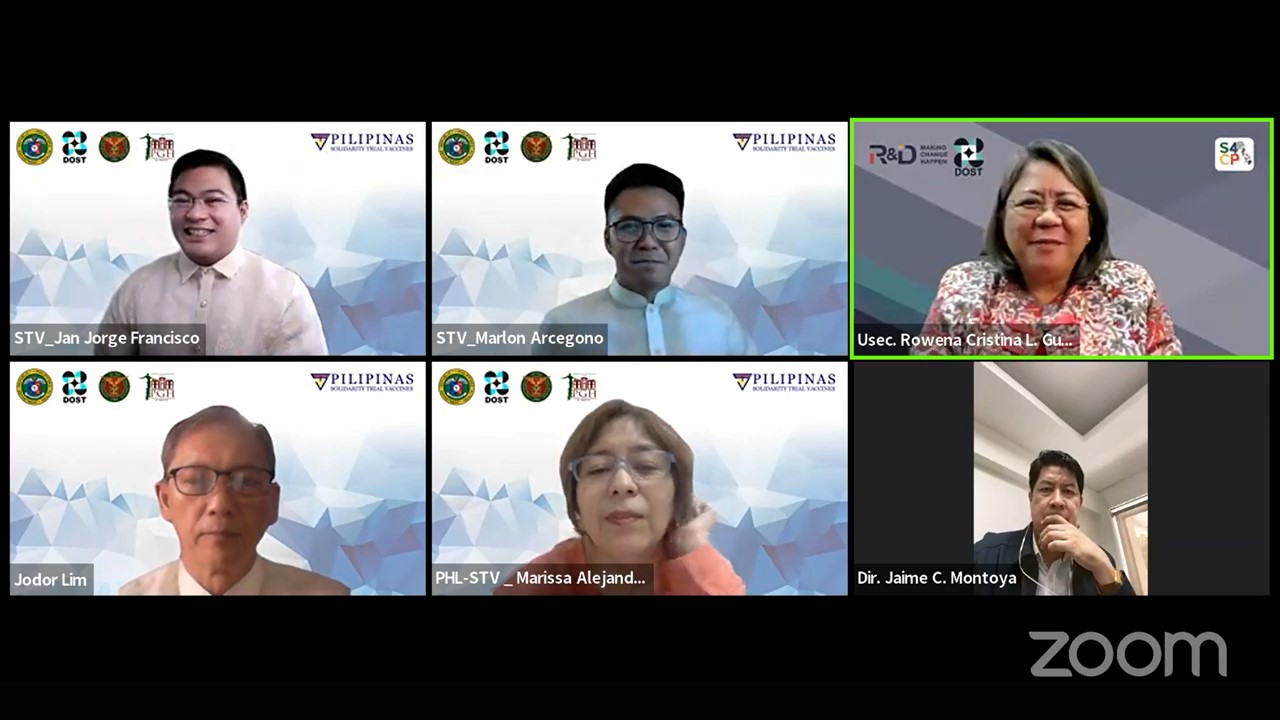COVID 19 UPDATES
DOST, DOH, and UPM officially launch WHO Solidarity Trial Vaccine in PH

Aiming to generate data on the efficacy of candidate vaccines against emerging variants of concern (VOCs) and determine the effective COVID-19 vaccines and doses that are suitable for the Filipino population, the Department of Science and Technology (DOST), Department of Health (DOH) and the University of the Philippines – Manila (UPM) officially launched the World Health Organization’s Solidarity Trial Vaccine (STV) in the country on 17 December 2021 via Zoom and Facebook live stream.
The clinical trial eyes to recruit a total of 15,000 Filipino volunteers from 20 identified sites and barangays with high COVID-19 attack rates across the National Capital Region (NCR). As of December 20, 2021, seven hospitals and two community-based sites have already conducted the recruitment activities with a total of 5,254 participants vaccinated with first dose and 3,142 participants already completed the two-dose schedule in the Philippines.
“The WHO-STV is a clinical trial, which aims to study the efficacy and safety of candidate vaccines. Continuing to participate in vaccine clinical trials remains of utmost importance, especially as the current global vaccine supply is still limited,” explains Chair of the Task Group on Vaccine Evaluation and Selection (TGVES) and DOST Undersecretary for Research and Development Rowena Cristina Guevara on how the clinical trial is separate from the country’s ongoing vaccination program.
Two of the four candidate vaccines is being initially studied: a spike adjuvanted vaccine developed by Medigen, and a DNA vaccine encoding the spike protein developed by Inovio, as identified by the WHO following the core protocol approved by the Philippine Food and Drug Administration (FDA), DOST-convened Vaccine Expert Panel, and the Single Joint Research Ethics Board (SJREB).
“Our ultimate goal in DOST-PCHRD, and in the Task Group on Vaccine Evaluation and Selection, is to ensure that before any candidate vaccine reaches our communities, it has already shown evidence that it is safe, effective, and suitable for human trials,” DOST-PCHRD Dr. Jaime C. Montoya says. “As we begin to implement the WHO Solidarity Trial Vaccines, we, especially our Philippine STV team, are in need of the united support and assistance of every Filipino in ensuring a smooth implementation of the clinical trials. In the end, what is equally important as scientific research is the spirit of unity and volunteerism among our Filipino communities,” he adds.
“Now that the vaccine trials are underway, we are hoping that the data we share with the other participants of the Solidarity Trials will contribute in finding more effective vaccines that can protect the Filipino people,” DOST Secretary Fortunato de la Peña says.
Led by the UPM-PGH, with support from the DOST and the DOH, the local clinical trial will serve as a contribution of the Philippines to the large-scale COVID-19 vaccine clinical trials headed by WHO. The trial has been launched in the Philippines, Mali and Colombia, while additional countries and vaccine candidates will follow shortly.
Interim results of the local clinical trial may be available to the public by early 2022.




